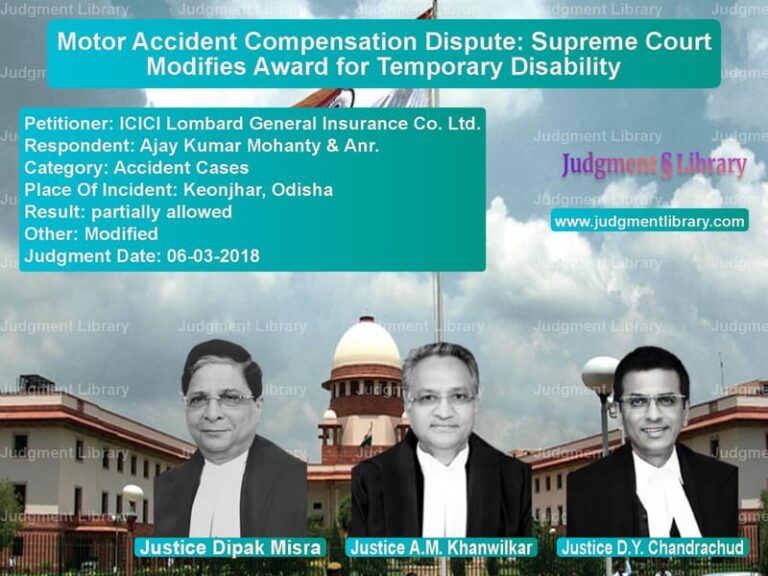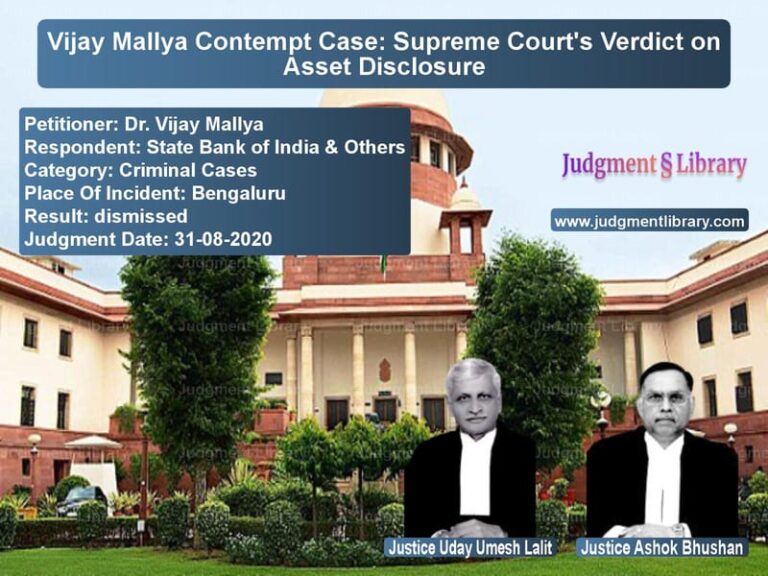Tenants’ Rights vs. Bank Recovery: Supreme Court Rules on SARFAESI Act and Rent Control Act
On January 20, 2016, the Supreme Court of India delivered a crucial ruling in Criminal Appeal No. 52 of 2016, along with several related appeals, concerning the conflict between the rights of protected tenants under the Maharashtra Rent Control Act, 1999 and the enforcement of security interests under the Securitisation and Reconstruction of Financial Assets and Enforcement of Security Interest (SARFAESI) Act, 2002. The case was led by the appeal Vishal N. Kalsaria vs. Bank of India & Others, which addressed the fundamental question: Can a tenant be evicted under the SARFAESI Act when the landlord defaults on a loan?
Background of the Case
The case arose when the landlords (respondent nos. 4 and 5) had taken loans from Bank of India (Respondent No.1) by mortgaging multiple properties, including the one occupied by the appellant, Vishal N. Kalsaria. When the landlords failed to repay the loan, their account was declared a non-performing asset (NPA). The bank, exercising its rights under the SARFAESI Act, issued a notice under Section 13(2) and later moved under Section 14 before the Chief Metropolitan Magistrate, Mumbai, seeking possession of the property.
The appellant, claiming to be a protected tenant under the Maharashtra Rent Control Act, filed a suit before the Court of Small Causes, Mumbai, and secured an injunction against eviction. However, the Chief Metropolitan Magistrate dismissed the appellant’s plea, citing the Supreme Court ruling in Harshad Govardhan Sondagar vs. International Assets Reconstruction Co. Ltd., which held that a tenant must produce a registered lease to claim protection against eviction.
Key Legal Issues
- Does the SARFAESI Act override the Rent Control Act?
- Can a tenant be evicted if their lease agreement is unregistered?
- What is the remedy available to tenants under such circumstances?
Arguments by the Appellant (Vishal N. Kalsaria)
- The Rent Control Act is a welfare legislation that protects tenants from arbitrary eviction.
- The appellant was a lawful tenant, paying rent, and his tenancy rights must be protected.
- Under the Rent Control Act, a landlord cannot evict a tenant without following due process, which includes approaching the Rent Court.
- The SARFAESI Act does not override the Rent Control Act, as both laws operate in different domains.
Arguments by the Respondents (Bank of India & Others)
- The SARFAESI Act allows secured creditors (banks) to take possession of properties without court intervention when borrowers default.
- Since the tenancy agreement was not registered, the appellant had no legal right to remain in the premises.
- The Rent Control Act applies only to landlords and tenants but does not bind banks recovering secured assets.
- Accepting the tenant’s arguments would make loan recoveries impossible and defeat the purpose of the SARFAESI Act.
Supreme Court’s Observations
The Supreme Court ruled in favor of the appellant, holding that:
“The Rent Control Act is a social welfare legislation that cannot be overridden by the SARFAESI Act. The two laws operate in completely different fields.”
The Court observed that allowing banks to evict tenants under the SARFAESI Act would render the entire Rent Control Act meaningless:
“If the contentions of the banks are accepted, landlords could simply mortgage tenanted properties and default on loans to evict tenants through banks instead of following due process under rent laws.”
The judgment also clarified that a tenant does not necessarily require a registered lease to claim protection. Even an oral tenancy, accompanied by rent payments, establishes a landlord-tenant relationship.
Supreme Court’s Ruling
The Supreme Court ruled:
- The provisions of the SARFAESI Act do not override the Rent Control Act.
- Tenants cannot be evicted under SARFAESI proceedings if they are protected under rent control laws.
- Unregistered tenancy agreements do not invalidate tenancy rights under rent control laws.
- Banks must follow the due process of law before evicting tenants.
- The Chief Metropolitan Magistrate erred in ordering eviction without considering the Rent Control Act.
Key Takeaways from the Judgment
- Tenants’ rights cannot be extinguished simply because a landlord defaults on a loan.
- The SARFAESI Act cannot be used to bypass the legal process for evicting tenants.
- Banks must verify tenancy status before granting loans secured against rented properties.
- Landlords cannot use banks as a tool to evict tenants illegally.
- Rent Control laws are social welfare legislations that must be respected.
Conclusion
The Supreme Court’s ruling in Vishal N. Kalsaria vs. Bank of India is a landmark decision that reinforces the principle that tenants’ rights cannot be arbitrarily extinguished under the SARFAESI Act. This decision provides relief to tenants across India who face eviction due to their landlords’ financial mismanagement and ensures that the rule of law prevails in property disputes. The judgment upholds the social justice intent of the Rent Control Act while ensuring that banks follow due process in debt recovery proceedings.
Don’t miss out on the full details! Download the complete judgment in PDF format below and gain valuable insights instantly!
Download Judgment: Vishal N. Kalsaria vs Bank of India & Othe Supreme Court of India Judgment Dated 20-01-2016.pdf
Direct Downlaod Judgment: Direct downlaod this Judgment
See all petitions in Landlord-Tenant Disputes
See all petitions in Judgment by V. Gopala Gowda
See all petitions in Judgment by Amitava Roy
See all petitions in allowed
See all petitions in supreme court of India judgments January 2016
See all petitions in 2016 judgments
See all posts in Civil Cases Category
See all allowed petitions in Civil Cases Category
See all Dismissed petitions in Civil Cases Category
See all partially allowed petitions in Civil Cases Category







